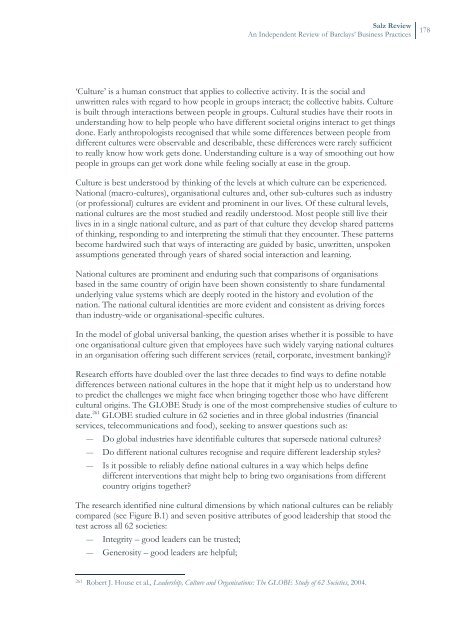Salz Review - Wall Street Journal
Salz Review - Wall Street Journal
Salz Review - Wall Street Journal
Create successful ePaper yourself
Turn your PDF publications into a flip-book with our unique Google optimized e-Paper software.
<strong>Salz</strong> <strong>Review</strong><br />
An Independent <strong>Review</strong> of Barclays’ Business Practices<br />
178<br />
‘Culture’ is a human construct that applies to collective activity. It is the social and<br />
unwritten rules with regard to how people in groups interact; the collective habits. Culture<br />
is built through interactions between people in groups. Cultural studies have their roots in<br />
understanding how to help people who have different societal origins interact to get things<br />
done. Early anthropologists recognised that while some differences between people from<br />
different cultures were observable and describable, these differences were rarely sufficient<br />
to really know how work gets done. Understanding culture is a way of smoothing out how<br />
people in groups can get work done while feeling socially at ease in the group.<br />
Culture is best understood by thinking of the levels at which culture can be experienced.<br />
National (macro-cultures), organisational cultures and, other sub-cultures such as industry<br />
(or professional) cultures are evident and prominent in our lives. Of these cultural levels,<br />
national cultures are the most studied and readily understood. Most people still live their<br />
lives in in a single national culture, and as part of that culture they develop shared patterns<br />
of thinking, responding to and interpreting the stimuli that they encounter. These patterns<br />
become hardwired such that ways of interacting are guided by basic, unwritten, unspoken<br />
assumptions generated through years of shared social interaction and learning.<br />
National cultures are prominent and enduring such that comparisons of organisations<br />
based in the same country of origin have been shown consistently to share fundamental<br />
underlying value systems which are deeply rooted in the history and evolution of the<br />
nation. The national cultural identities are more evident and consistent as driving forces<br />
than industry-wide or organisational-specific cultures.<br />
In the model of global universal banking, the question arises whether it is possible to have<br />
one organisational culture given that employees have such widely varying national cultures<br />
in an organisation offering such different services (retail, corporate, investment banking)?<br />
Research efforts have doubled over the last three decades to find ways to define notable<br />
differences between national cultures in the hope that it might help us to understand how<br />
to predict the challenges we might face when bringing together those who have different<br />
cultural origins. The GLOBE Study is one of the most comprehensive studies of culture to<br />
date. 261 GLOBE studied culture in 62 societies and in three global industries (financial<br />
services, telecommunications and food), seeking to answer questions such as:<br />
― Do global industries have identifiable cultures that supersede national cultures?<br />
― Do different national cultures recognise and require different leadership styles?<br />
― Is it possible to reliably define national cultures in a way which helps define<br />
different interventions that might help to bring two organisations from different<br />
country origins together?<br />
The research identified nine cultural dimensions by which national cultures can be reliably<br />
compared (see Figure B.1) and seven positive attributes of good leadership that stood the<br />
test across all 62 societies:<br />
― Integrity – good leaders can be trusted;<br />
― Generosity – good leaders are helpful;<br />
261 Robert J. House et al., Leadership, Culture and Organisations: The GLOBE Study of 62 Societies, 2004.
















